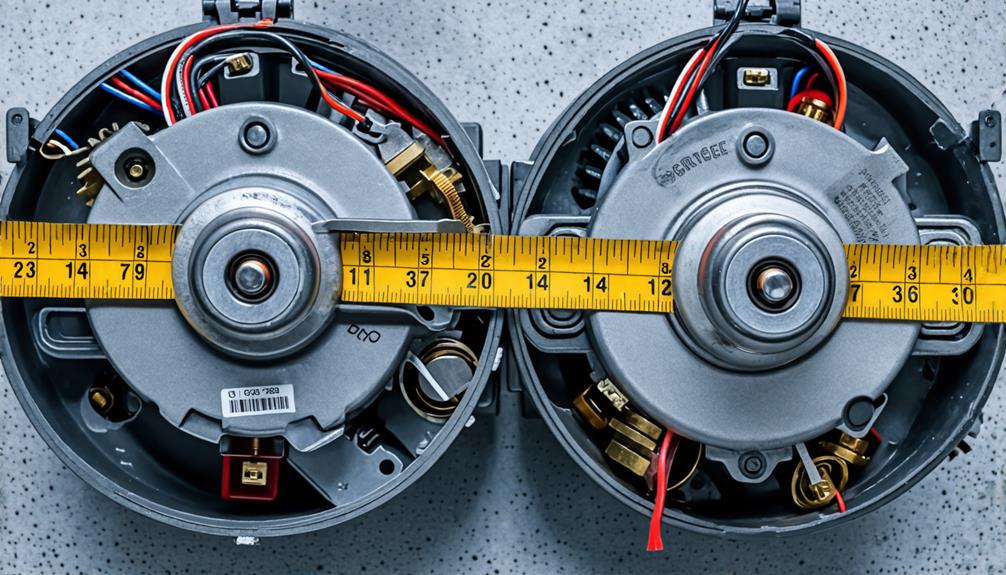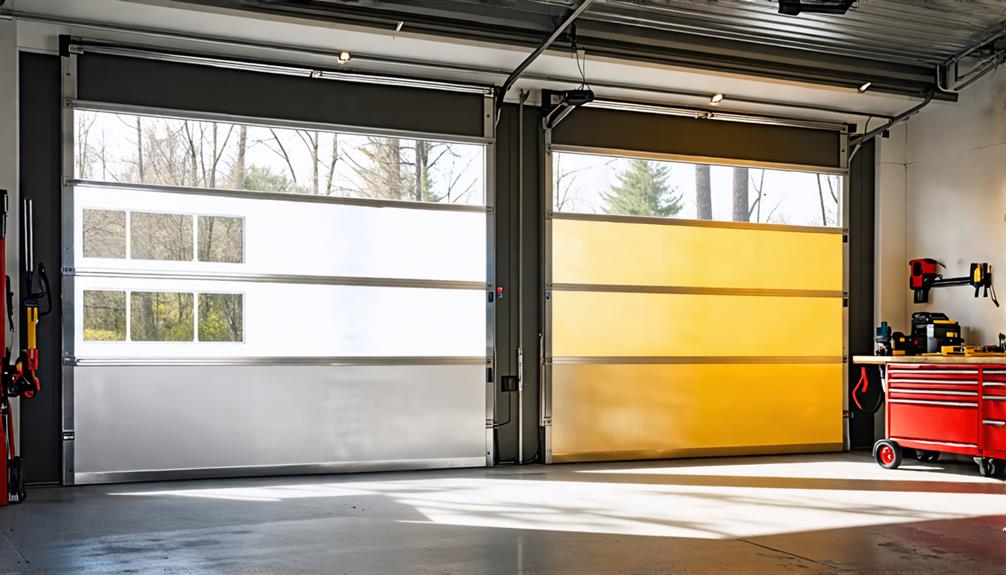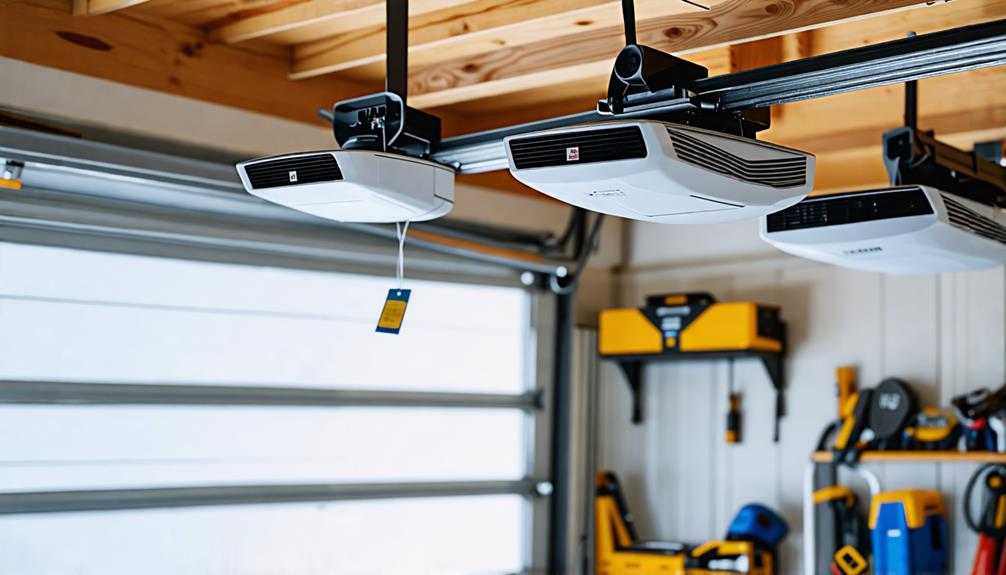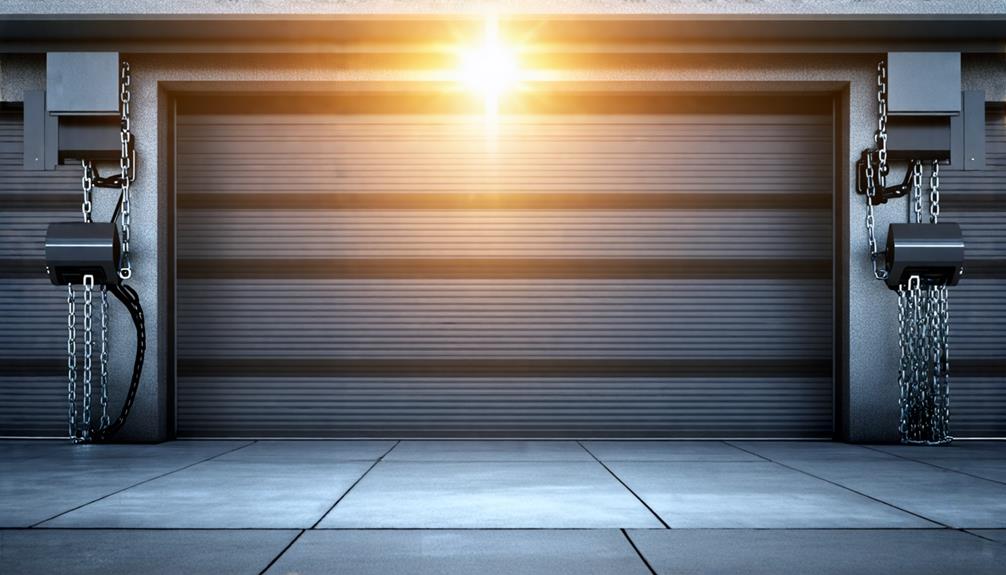
Should I Get 1/2 Hp or 3/4 Hp Garage Door Opener?
Your choice between a 1/2 HP and 3/4 HP garage door opener depends on several factors. Consider your door's weight, size, and material composition. For standard residential doors, a 1/2 HP unit usually suffices, while heavier, insulated wood doors may require a 3/4 HP model. Higher horsepower offers advantages in handling oversized or custom doors, improved energy efficiency, and potentially greater long-term durability. However, 1/2 HP openers generally consume less energy. Evaluate your specific needs, including usage frequency and climate conditions. Don't forget to account for installation requirements and costs, which vary between professional and DIY options. The following information will help you make an informed decision based on your unique situation.
Horsepower Measurement Explained

When you're choosing a garage door opener, you'll often encounter horsepower ratings, which indicate the motor's power output. This is similar to when you choose between different services offered, like installation or repair, where the specifics of the choice depend on your unique needs.
Understanding these measurements is essential, as they're typically expressed in horsepower (HP) or, less commonly, in Newton meters (Nm) for some European models. Just as you'd assess a garage door for potential panel repair or preventive maintenance, it's important to evaluate the power needs of your garage door opener.
To compare different units, it's helpful to know that 1 HP equals approximately 745.7 watts or 1.36 Nm, allowing you to make informed decisions about the power required for your specific garage door setup.
Defining Garage Door Horsepower
Picking out a garage door opener often boils down to horsepower, but this measurement isn't as straightforward as you might think. In the domain of garage door openers, horsepower doesn't directly correlate to the power output you'd expect from other motorized devices. Instead, it's a relative measure of lifting force, which manufacturers use to categorize their products.
When you're comparing garage door openers, you'll typically encounter fractional horsepower ratings like 1/3, 1/2, or 3/4. These numbers indicate the opener's ability to lift and lower your garage door smoothly and effectively. However, it's essential to understand that a higher horsepower rating doesn't always mean better performance. The ideal horsepower for your garage door depends on various factors, including the door's weight, size, and material composition.
For instance, a lightweight aluminum door might only require a 1/3 HP opener, while a heavier, insulated wood door could necessitate a 3/4 HP unit. Have you considered your door's specific requirements? Remember, choosing the right horsepower guarantees proper operation, energy efficiency, and longevity of your garage door system.
Measurement Units Explained
Understanding the horsepower measurement for garage door openers is essential to choosing the appropriate unit for your needs. When you're comparing garage door openers, you'll often see horsepower (HP) ratings like 1/2 HP or 3/4 HP. These measurements indicate the motor's power output, which directly affects the opener's performance. However, it's important to remember that horsepower isn't the only factor to take into account when choosing an opener.
To better understand horsepower measurements for garage door openers:
- Recognize that 1 HP equals 746 watts of power.
- Know that fractional HP ratings (e.g., 1/2, 3/4) are common for residential use.
- Understand that higher HP doesn't always mean better performance.
- Consider that some manufacturers use alternative units like lifting force.
While HP provides a general indication of an opener's strength, it's vital to consider other factors such as the door's weight, size, and material. Additionally, modern openers may use DC motors, which can provide equivalent or superior performance to higher-rated AC motors. When evaluating HP ratings, consult the manufacturer's specifications and consider your specific garage door requirements to guarantee you select an opener that will operate efficiently and reliably.
Power Conversion Factors
Power conversion factors come into play when you're comparing garage door openers with different motor types or power ratings. You'll often encounter horsepower (HP) as the standard measure, but it's pivotal to understand how this translates across various systems. For instance, 1 HP equals approximately 746 watts or 0.75 kilowatts.
When evaluating garage door openers, you might see ratings in HP, watts, or even Newton meters (Nm) for some European models. To convert between these units, you'll need to use specific formulas. For example, to convert HP to watts, multiply the HP value by 745.7. Conversely, to convert watts to HP, divide the watt value by 745.7.
Why is this important? It allows you to accurately compare the power output of different models, regardless of how they're marketed. Remember, a higher HP doesn't always equate to better performance. Factors like torque, speed, and efficiency also play indispensable roles. When considering a 1/2 HP versus a 3/4 HP opener, how does this translate to actual lifting capacity? Understanding these conversion factors helps you make an informed decision based on your specific garage door's requirements.
Benefits

When choosing a garage door opener, you'll want to ponder several key benefits that can markedly influence your daily life. Higher horsepower models offer the power needed for heavy doors, a pivotal factor for both commercial and residential installations.
The choice between a 1/2 HP or 3/4 HP garage door opener can also be swayed by the type of door you have; heavier doors may require more horsepower for effective operation. Energy-efficient options can help reduce your electricity bills over time.
Additionally, you should weigh the importance of noise levels and long-term durability, as these factors can affect both your immediate comfort and the overall value of your investment.
Power for Heavy Doors
Heavy garage doors are no match for high-powered openers. When you're dealing with oversized, insulated, or custom doors, you'll need an opener with enough muscle to handle the load. A 3/4 horsepower opener offers the extra strength required for these demanding situations, ensuring smooth operation and longevity.
Consider these factors when choosing a powerful opener for heavy doors:
- Door weight: Measure your door's weight to determine the necessary horsepower.
- Frequency of use: High-traffic garages benefit from stronger motors that can withstand frequent cycling.
- Climate considerations: Extreme temperatures can affect door performance, requiring more power.
- Future upgrades: Plan for potential door replacements or additions that may increase weight.
While a 1/2 horsepower opener might suffice for standard doors, opting for a 3/4 horsepower model provides a buffer for unexpected weight increases. This extra power can accommodate additions like insulation or decorative panels without straining the motor. Remember, an underpowered opener may struggle, leading to premature wear and potential safety issues. By investing in a more robust opener, you're ensuring reliable operation and peace of mind for years to come.
Energy Efficiency Comparison
Three key benefits make energy-efficient garage door openers a smart choice for homeowners. First, you'll see a reduction in your electricity bills, as these models consume less power during operation. Second, energy-efficient openers often have longer lifespans, reducing the frequency of replacements and associated costs. Third, they contribute to a smaller carbon footprint, aligning with environmentally conscious practices.
When comparing 1/2 HP and 3/4 HP models, you'll find that the 1/2 HP openers generally consume less energy. However, it's important to evaluate your specific needs. If you have a heavier door or use it frequently, a 3/4 HP model might be more effective in the long run, as it won't strain as much during operation. Look for openers with DC motors, which are typically more energy-efficient than AC motors. Additionally, consider models with standby power modes that greatly reduce energy consumption when not in use. Some manufacturers offer Energy Star certified openers, which meet strict energy efficiency guidelines set by the U.S. Environmental Protection Agency and the Department of Energy. How much can you save? While exact figures vary, energy-efficient models can reduce power consumption by up to 75% compared to older, less efficient units.
Noise Level Differences
Beyond energy efficiency, noise levels play a crucial role in choosing the right garage door opener. When comparing 1/2 HP and 3/4 HP models, you'll notice some differences in their acoustic output. Generally, 3/4 HP openers tend to be slightly louder due to their increased power, but modern designs have substantially reduced this gap.
Consider these factors when evaluating noise levels:
- Motor type: DC motors are typically quieter than AC motors, regardless of horsepower.
- Belt drive vs. chain drive: Belt-driven systems offer quieter operation compared to chain-driven models.
- Vibration isolation: Look for units with anti-vibration technology to minimize noise transfer.
- Installation quality: Proper mounting and alignment can greatly reduce operational noise.
You'll find that both 1/2 HP and 3/4 HP openers can operate quietly when designed with noise reduction in mind. However, if you're particularly sensitive to sound or your garage is adjacent to living spaces, you might prefer a 1/2 HP model. Remember, the difference in noise levels between well-designed units of either horsepower rating is often negligible, so don't let this be the sole determining factor in your decision.
Long-Term Durability Considerations
When considering a garage door opener's long-term durability, the horsepower rating plays a significant role. A 3/4 HP motor typically offers greater longevity than its 1/2 HP counterpart, as it operates with less strain during each cycle. This reduced stress translates to fewer repairs and a potentially extended lifespan for your opener system.
You'll find that 3/4 HP models often incorporate higher-quality components, such as reinforced gears and more robust drive mechanisms. These enhanced features contribute to improved wear resistance, particularly in challenging environments or with frequent use.
Have you considered the impact of extreme temperatures on your opener? A 3/4 HP unit generally handles temperature fluctuations more effectively, maintaining consistent performance year-round.
While 1/2 HP openers can suffice for standard residential doors, opting for a 3/4 HP model provides a buffer against future modifications. Should you decide to upgrade to a heavier, insulated door or add windows, your opener will be equipped to handle the increased load without compromising its durability. Remember, investing in a more powerful opener now may save you from premature replacements and costly maintenance in the long run.
Installation Considerations and Costs

When considering a garage door opener installation, you'll need to evaluate several key factors. You'll want to assess the available space above your garage door, determine whether you're comfortable with a DIY approach or prefer professional installation, and weigh the associated costs. To help you make an informed decision, consider the following comparison of professional and DIY installation options:
| Aspect | Professional Installation | DIY Installation |
|---|---|---|
| Average Cost | $200 – $500 | $150 – $300 |
| Time Required | 2-4 hours | 4-8 hours |
| Warranty Coverage | Often included | May be limited |
| Tools Required | Provided by installer | Must be purchased/rented |
| Technical Expertise | Guaranteed | Varies by individual |
Space and Mounting Requirements
In addition to selecting the right garage door opener, you'll need to contemplate the space and mounting requirements for proper installation. The type of opener you choose will dictate the amount of overhead space required and the mounting configuration.
Consider these key factors:
- Headroom clearance: Measure the distance between the top of your garage door and the ceiling. You'll typically need at least 2-3 inches of clearance for most openers.
- Ceiling height: For standard sectional doors, a minimum ceiling height of 7.5 feet is recommended to accommodate the opener and rail system.
- Side clearance: Verify there's sufficient space on either side of the door for the opener's components and to allow for proper operation.
- Mounting options: Determine whether you'll need a wall-mount, ceiling-mount, or jackshaft opener based on your garage's layout and available space.
When evaluating your garage's dimensions, don't forget to account for any obstructions such as light fixtures, storage racks, or ductwork. These elements may impact the placement of your opener and require adjustments to your installation plan. Have you considered consulting a professional to assess your space and recommend the most suitable mounting configuration for your specific garage door setup?
Professional Vs DIY Installation
After evaluating your garage's layout and space requirements, you'll need to decide whether to install the garage door opener yourself or hire a professional. DIY installation can save you money, but it requires time, tools, and a certain level of mechanical aptitude. You'll need to carefully follow the manufacturer's instructions, guarantee proper wiring, and safely mount the opener.
Professional installation, while more expensive, offers peace of mind and expertise. Technicians can quickly identify potential issues, guarantee proper alignment, and often provide warranties on their work.
When considering costs, factor in more than just the price of the opener. For DIY, you may need to purchase additional tools or equipment. Professional installation typically includes all necessary hardware and often comes with a service guarantee. How much value do you place on your time? A professional can usually complete the job in a few hours, while DIY might take a full day or more.
Safety is another essential consideration. Improper installation can lead to malfunctions or accidents. If you're uncomfortable working with electrical components or heavy machinery, professional installation is likely the safer choice.
Cost Comparison Breakdown
To fully grasp the financial implications of garage door opener installation, you'll need to break down the costs for both DIY and professional options. When comparing 1/2 HP and 3/4 HP models, consider the following factors:
- Unit Cost: 3/4 HP openers typically cost $50-$100 more than their 1/2 HP counterparts.
- Installation Materials: Additional brackets, wiring, or mounting hardware may be required for heavier 3/4 HP units.
- Labor Charges: Professional installation fees might increase for 3/4 HP models due to their weight and complexity.
- Energy Consumption: 3/4 HP openers consume more electricity, potentially raising long-term operating costs.
If you're opting for DIY installation, you'll save on labor costs but may need to invest in specialized tools. Professional installation, while pricier upfront, often includes warranty coverage and guarantees proper setup.
Have you considered your garage door's weight and usage frequency? Heavier doors or high-traffic garages may justify the extra expense of a 3/4 HP opener. Remember to factor in potential energy savings of newer models, regardless of horsepower, as they often feature more efficient motors and standby modes that can offset initial costs over time.
Frequently Asked Questions
How Long Do Garage Door Openers Typically Last?
You can expect your garage door opener to last 10-15 years with proper maintenance. However, it's not uncommon for some to function for up to 20 years. Regular servicing and prompt repairs can notably extend its lifespan.
Can I Upgrade My Existing Opener's Horsepower?
You typically can't upgrade your existing opener's horsepower. It's not as simple as swapping out a motor. If you need more power, you'll usually have to replace the entire opener unit with a higher horsepower model.
Are There Smart Home Features Available for Garage Door Openers?
Yes, you'll find many smart home features for garage door openers. You can control them remotely using your smartphone, set schedules, receive alerts, and integrate with other smart devices. Some even offer voice control through virtual assistants.
Do Higher Horsepower Openers Operate More Quietly?
Higher horsepower doesn't necessarily mean quieter operation. You'll find noise levels depend more on the opener's drive system and overall construction. Belt-drive openers are typically quieter than chain-drive models, regardless of their horsepower rating.
What Maintenance Is Required for Garage Door Openers?
You'll need to regularly lubricate moving parts, tighten hardware, and check safety features. Clean the tracks, adjust the door balance, and test the auto-reverse function. Replace worn parts and batteries in remote controls as needed.





